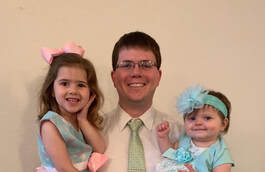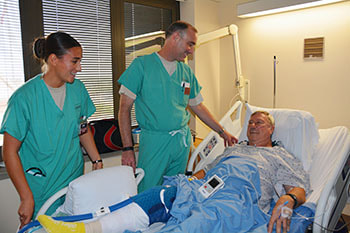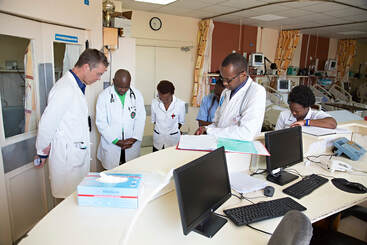|
Jesus was the son of a carpenter and thus learned how to work with wood and fix things with his hands. I tend to believe learning how to be a carpenter formed Jesus into the patient, understanding, and future oriented person he was. So today we look closer at the spiritual practice of woodworking. There is something magical about taking a piece of wood and forming it into a beautiful structure. This act of creating is an experience. It provides intrinsic meaning beyond just the physical morphing of material but one that resides in the soul. Woodworking allows are hands and body to act while creating something spiritual in nature that represents part of who we are. Just seeing the grains and lay of the wood, deciding the cut, and envisioning how it can become more vibrant with the various stains or oils connects us. We are able to be present in the moment letting go of any conflicts, desires, challenges, etc. that are at play in our life. This spiritual practice in essence centers us while we physically work to create something inspiring, useful, or meaningful. Let's look further at the lessons we learn from the spiritual practice. 5 Life Lessons From Woodworking 1. Understand the Grain of the Wood - When you are woodworking it is necessary to know the grain of the wood. Sometimes we have to go with the grain and work with it to form what we need. Other times we have to cut across it to get our desired result. This translates to us to always assess our situations to determine what is best for the results we want. Many times with our faith that will be going against the grain of society and sticking to our morals and principles. 2. Envision what could be - It takes a vision to really see what something could be. Amazing pieces can be created with just a little envisioning. We are the same way. We need to envision what a spiritual relationship could be and work toward it. The mere act of seeing and believing propels us to who we want to be. 3. Imperfections are learning opportunities - When working with wood flaws will ultimately happen. But most of the time those flaws do not deflect the natural beauty and usefulness of the product. Those imperfections teach us the best ways to work with them and what positives qualities they bring in the material. This principle is also true in us. We all have our own imperfections but those do not take away from our natural beauty and worth. 4. Take your time - Woodworking is a process! It takes time and patience is required. Cutting, planing, joining, and finishing all are pieces that take time to create the product we want. This tells us to not be in a hurry but be patient with our life. Enjoy the moments we have and take the time necessary to create who you want to be. 5. Finish what you started - Choosing the type of finish for your wood is important. We must look at the colors and select the best oil or stain. Finishing the wood makes it pop with color, showing all the amazing qualities of the grain and the quality of the work. This lesson applies to us as well. When we finish the challenges or things put before us we also pop with the color of pride and satisfaction. The act empowers us to be the best person we can and moves us forward to our next task. Woodworking can be a great skill and activity to enjoy. But in the right mindset can also be a very freeing spiritual practice to partake in. Using these lessons above and others when we work with wood can help us connect with the divine in our life. I encourage you to learn, utilize and practice this skill. Thank you for all those who join with the Community of Christ as a piece of the greater Christian community striving to do good in this world and bring worth to people.
This week find a piece of furniture or object created out of wood. Feel it, envision what it was before it was formed, think about the imprint the creator put on it, and thank the universe for its creation. Now do the same for yourself!
1 Comment
 Our guest blogger this week is Tyler Jones. Tyler lives with his wife Autumn and 2 daughters, Summer and Sutton, in the Oklahoma City area. He is a member of the Edmond congregation where he is stretching his Elders legs as a new Co-Pastor. He is a doctor trained in internal medicine and works as a hospitalist (he only sees patients in the hospital setting). His time is packed full of kids activities, but any free time he gets he enjoys going to movies and binge watching TV shows. So, there I was, sitting in the intensive care unit as I do every morning when I work. I was talking to a patient who we’ll call John. John, who was well into his 70s, had been in the hospital, more specifically, the ICU for over 3 weeks battling a disease that was causing his kidneys to shut down. He and his wife, who was always by his bedside, were listening to me talk about trying to change our approach to fight this sickness that was destroying him. He had struggled on and off of the ventilator for weeks and had been undergoing daily dialysis treatments for his kidneys. John was tired, but not only that, he wasn’t getting better. I could see how tired he was. As I finished my explanation of what we wanted to do next to try to help him, I stopped. I moved closer to him so I could be sure I would be able to hear him as he was very weak. “Do you still want to fight this”, I asked. “Do you want us to continue to keep trying new things, or are you wanting us to stop?” I leaned in close as he told me how tired he was. He didn’t want to keep going. He was ready to die. Working in healthcare, and especially in the hospital, means that I am tasked with caring for people in some of their most vulnerable moments. It’s often said about those in healthcare, that we see people on the worst days of their lives. Death is just a part of my job. Not an intended one, of course, but one that is unfortunately unavoidable. As humans, we seem to reach out in prayer more often when times are hard. I know I pray far more often when I’m struggling than when times are good. Prayer is especially strong in hospitals. We have employed chaplains whose sole job is to help provide counseling and spiritual assistance to people who are suffering. Sometimes, as the ones taking care of the patients, those directly involved in the decisions about people’s lives, it is easier to just let the chaplain and pastors take care of the spiritual needs of the patients. I know it saves time. It is hard to pray with patients. It’s hard to pray with people in general sometimes, especially strangers. I often feel this internal conflict when it comes to praying with patients. On one hand, do they want me to pray with them? Believe it or not, some patients aren’t very fond of me, or their doctors in general. Doctors are the ones who give bad news. We are the vehicle of sorrow and despair. I often wonder if I’m the best person to be praying with people after giving them terrible news. This may not be a legitimate concern, but I wonder none the less. On the other hand, if not me, then who? I am often placed in unique positions of vulnerability with patients and families. When I pray with people, for people, there is a shared moment of connection through God and the Holy Spirit. It becomes deeper than just a patient doctor relationship. How can I pass up the opportunity to share in that connectedness with someone who is longing for peace and comfort? When praying for the sick most pray for healing. Sometimes this can be difficult. Do I pray for healing in patients who I know are never getting better? I’ve heard prayers where preachers exuberantly command the sickness to leave the body. They cast out cancers and disease with confidence and fiery passion. Don’t get me wrong, I believe that miracles can happen. There are times when I can’t explain why or how certain things happen, but I also know that those times are limited. People want miracles, but sometimes I know all too well what the future holds for people. I’ve seen it too many times before. So what do I pray for when I pray with patients? Peace. Comfort. The presence of the Holy Spirit to rest with them and their families and loved ones. Instead of casting out sickness, I ask that worry and regret are forgotten. I pray that the love that God has for them will burn in their hearts and that they know that they have a God that cares for them deeply. I ask that whatever the outcome, whether it be good or bad, that they know that they are not alone. They will always have the love of their family, friends, and the peace of Jesus. People fear the unknown, and there is no greater unknown than death. As I sat in the ICU with John and his wife, I took their hands and asked if they would like me to pray with them. As I did then and have done since, I became vulnerable with them. I opened my heart to them and they to me. We shared in a moment of connectedness and devotion that I will never forget. I never saw either of them after that prayer, but I know that the peace of the Holy Spirit was with both of them as it is with all of us if we allow ourselves to be open to it. A big thank you to Tyler for sharing with us his unique perspective and powerful ministry. Please post any comments you have about the article as we would love to hear them!
This week take a risk by opening yourself to the moments you are placed in. Connect with those around you and be vulnerable to divine grace. Jacob was left alone; and a man wrestled with him until daybreak. When the man saw that he did not prevail against Jacob, he struck him on the hip socket; and Jacob’s hip was put out of joint as he wrestled with him. Then he said, “Let me go, for the day is breaking.” But Jacob said, “I will not let you go, unless you bless me.” So he said to him, “What is your name?” And he said, “Jacob.” Then the man said, “You shall no longer be called Jacob, but Israel, for you have striven with God and with humans, and have prevailed.” Then Jacob asked him, “Please tell me your name.” But he said, “Why is it that you ask my name?” And there he blessed him. So Jacob called the place Peniel, saying, “For I have seen God face to face, and yet my life is preserved.” - Genesis 32:24-30 Have you ever regretted something you have done? Has something ever weighed on your heart that it overwhelmed your thoughts? This is exactly where we find the character Jacob in this scripture. Jacob is returning to the land of Canaan, his home, where he had grown up. It's the place he fled twenty years before to avoid his brother Esau who was out to kill him for stealing their father's blessing. Blessings from fathers were a traditional way to pass down inheritance to the oldest son. Jacob was not the oldest but pretended to be when his father was on his death bed. The act of betrayal against his brother Esau left only one way out and that was to run. Often times we run from things in our life or from our past. Are you running from anything now? Jacob ran from his past. He started a family and settled down making a new life for himself in Laban. Despite the success he made, he internally was still running from the wrongs he had committed. It is in this conflictual state that Jacob decided to journey with his family back to Canaan to make peace with his brother. The weight of unease was too much for him to bear anymore. No matter what may come he had to make things right. It is at this spot where we find Jacob who has just crossed into Canaan wrestling someone until the morning. Jacob was most likely fearful as he had been told his brother was coming to meet him with 400 men. He sent his family across the river so he could be in solitude. There's no indication originally of who Jacob is wrestling or why. The scripture indicates Jacob prevails in the match and his opponent is God. It also states Jacob asks for a blessing after the altercation which is the same thing he stole from his brother ironically. We will never know if Jacob actually wrestled God or if it was a figurative way of Jacob working through his internal struggle with the divine. We know the turmoil and conflict Jacob was most likely enduring which may have prompted this experience. Did he actually win against God or was it he came to a new understanding of who he was, accepting the past for what it was? Jacob just might have really saw who he was through all the facades he tried to hide behind. In this authentic experience the real Jacob prevailed over the guilt and shame of his past. He knew whatever his future holds, it would not be defined by what had happened but what he would be about from here forward. The name change is what is significant here. This name gives Jacob new meaning for who he is beyond his past convictions. It erases the shame he held for his actions. Relevance for us Today Each one of us has conflicts and struggles we wrestle with in our daily lives. Sometimes these are things from our past like Jacob. This scripture tells us to wrestle with those struggles with God. We must include the divine in the chaos of our lives. The scripture also asks us to really look at who we are now instead of the person we were in the past. God wants us to wrestle with our internal feelings of shame and guilt and come to a new understanding that we are ok with. An understanding that you are who you are and that is enough. It is someone that the divine wants to see face to face. It is someone God wants to call by name and bless. So lay down your burdens, forgive yourself, and lean into the blessings God is wanting to bestow on you. I hope these few blogs about certain scriptures has been useful for you. If so please comment below.
This week know God is working through your struggles with you. |
Please Note The views expressed here are those of the authors and do not necessarily represent or reflect the views of Community of Christ. We believe individuals should be allowed to have their own opinions and be at different places in their faith journey.
Categories
All
Archives
June 2021
|
|
Emporia Ministry
c/o Midlands Mission Center 7615 North Platte Purchase Drive Kansas City, Missouri 64118 Phone: (816) 221-4450 |
Copyright Midlands Mission Center 2024
|
International Headquarters
Community of Christ 1001 West Walnut Independence, Missouri 64050 Phone: (816) 833–1000 or (800) 825–2806 |













 RSS Feed
RSS Feed
